#fvrcp
Explore tagged Tumblr posts
Text
guess who did intake on ten panleuk/panleuk exposed kittens yesterday……………….

8 notes
·
View notes
Text
Information to know about your pet… before you visit the vet:
- What kind of food does your pet eat? Include the brand name and flavor, as well as the amount fed and how often they eat. Remember that “one scoop” doesn’t mean much, so be sure to quantify it in cups, etc. before your next visit. Don’t forget to mention treats, or any recent diet changes!
- What medications, if any, does your pet take? Please know the drug name, dosage, and frequency, as well as how long they’ve been on it. Preventatives count as meds too! Different brands protect against different parasites, so be sure to know which your pet takes.
- Is your pet ever exposed to other animals? This includes animals in the home, at the dog park, groomers, daycare, boarding, and play dates with neighbors or friends. When was their most recent exposure?
- Is your pet up to date on vaccines? Which ones? Just the core vaccines (rabies and DHPP for dogs/FVRCP for cats), or non-core such as lepto, influenza, Bordetella, and/or feline leukemia as well? If not up to date, did they ever receive any vaccines in the past, and when?
- Does your pet have any relevant medical history? Please disclose any previous illnesses or surgeries you are aware of to your vet team.
- What is your pet’s spay/neuter status? Different reproductive diseases affect intact and altered animals. If you’re unsure, just let us know!
- Has your pet traveled recently? This includes everything from trips out of the country to a day drive across town for a swim at the lake. Certain toxins and diseases are more prevalent in different environments.
- Is your pet nervous or aggressive? There’s no shame in this! Please let us know for our safety and your pet’s.
Remember that not all vet visits are planned, so be sure to learn this information ahead of time. I hope this helps better equip you to advocate for your pet!
Fellow vet professionals, feel free to add on!
2K notes
·
View notes
Note
Any advice on how to find local and reputable cat breeders? Websites? Keywords? Things to look out for?
I'd start at a cat show, tbh. It's a good way to meet people in the community, meet their cats personally, and really just talk to them. Cat breeders love to talk about their animals, so you'll learn a lot.
But this is pretty unrealistic for a lot of people. :/ That's a lot of travel time, possibly time off of work, not to mention it's fucking exhausting. So let's be a bit more realistic.
You want to figure out what breeds you're interested in first and learn as much as possible about them. You want to know what health problems they've got, if there are tests for said health problems, and what you're potentially getting into.
Once you've sorted out your breeds of choice, make your way over to TICA's website. Just being listed here isn't a guarantee of a good breeder or anything; it's just a list of breeders who SUPPOSEDLY follow TICA's guidelines. Not all of them do; it's not like anyone actually checks on these things.
And this is why you've really got to research your breed beforehand: you want to be able to ask the breeder, "Hey, I know sphynxes have heart problems; do you do frequent scans for HCM and can I see the results?" or "progressive retinal atrophy can be a problem in bengals; do you do genetic tests for it and can I see the results?" or "maine coons can get hip dysplasia; do you have any OFA scores I can see for your cats?" Just whatever the health problem in your breed is, don't be afraid to ask about it and ask for scans, tests, etc. You want to be able to personally see them.
A good breeder will be able to provide tests and scans and be more than happy to let you take a look at them.
Ideally, you'd be able to meet the cats in their home. At the very least, meeting the mother is a good sign. You might not meet the sire, because a lot of breeders do not want to keep their tomcats on site due to the smell, conflict, and lack of space for multiple cats. Or they may have used artificial insemination. I don't think that's particularly common in cats (at least compared to dogs), but it's a thing that happens.
Red flags:
Insists you feed a particular type of food (raw, Paw Tree, etc)
Tells you to avoid vaccines/deworming (your new kitten should have AT LEAST 2 FVRCP vaccines by 14 weeks old and a deworming)
Refuses to do tests or refuses to show you the results
Won't show you a pedigree
Says their cats are immune to FIP
Offers to sell you an unaltered kitten (especially in the US)
Selling kittens too young (8 weeks is absolute MINIMUM legally; I'd prefer to see kittens with their mothers until they are 14-15 weeks). Some bad breeders will try to use the line 'the mother is rejecting the kittens' or 'they're already using litter and eating solid food'.
Pressure to buy immediately
Not allowing you to interact with the kitten
Not showing the cats in shows
Too many litters in a single year or has kittens always available -- it's a sure sign that they're mass producing cats
Breeding multiple breeds -- typically, a breeder will be very focused on just one or two breeds.
#ethics of breeding#TICA isn't the only cat association either!#there's also CFA#there's just a LOT of crossover between their sites#someone who shows under TICA probably also shows under CFA anyway
215 notes
·
View notes
Note
Since I've now seen posts about your kitten tips twice, I'll add my two cents from an actual vet clinic. Tw medical language.
Please watch your male cat's weight, especially if they're neutered. Overweight male neutered cats are prone to urinary blockages, which can be very quickly fatal. If your male cat is crying in the litter box or has blood in their urine, make a vet appointment ASAP (as in the same or next day).
Cats don't show the same emergent signs as dogs. The main thing that I've seen people brush off a lot is open-mouth panting. Cats don't (usually) pant, if they've never done it before then call a vet.
Get your cats spayed/neutered. They can breed at or even before 6 months old. Call your local animal shelter, most of them have spay/neuter clinics that are much more affordable. Same goes for rabies and fvrcp/felv vaccines: usually there are affordable clinics at certain times.
Don't feed only wet food, not having something to chew on like hard food can lead to tarter build up and eventually tooth loss.
Like one ask said, get kittens comfortable with having their feet touched. I got mine comfortable with being held on their backs and now clipping nails is super easy.
I can't think of much else, but good luck with your kitties!!
Thank you!! ♡
375 notes
·
View notes
Text
Took Tumbleweed to work with me today to get his rabies booster.
I knew he was overweight. Didn't know he was 3 pounds overweight so my man is getting put on a diet. His broken canine didn't communicate with the pulp chamber so he gets to keep it. Vet agreed that he did not make his upper carnassial teeth, and instead just has more little premolars. I get to monitor him closely to make sure he doesn't have a weird vaccine reaction like he did to the FVRCP last year.
He is also the first CH cat my vet has seen in person! She is enamored with him and his dumb face.
Tumble will definitely be happy to get back home.
231 notes
·
View notes
Text




Melito from Cat Angel Network in Forest Knolls, California
Click here for more information about adoption and other ways to help!
Click here for a link to Cat Angel Network's main website.
Age & Gender: 2-3 years old / Male
Important info: Ear tipped (not shown in picture), already fixed and has gotten rabies and one FVRCP.
Story and personality:
He was a stray from Modesto at a location where there are a lot of homeless cats. He was picked up for TNR (trap, neuter, release) but was found to be very friendly.
Melito is a super chill cat that has made himself very comfortable in his foster home. He has several foster siblings and he’s integrated himself among them very well. He would do well in a home with another young adult cat.
Melito LOVES food and treats. If you need his attention all you need to do is open a can of food or shake a bag of treats.
Melito takes a little bit of time to trust a new person but once he does he seeks affection and cuddles. He’d be a great fit for someone looking for a mellow and easy going cat. He does play and run around a bit but he’s also a fan of lounging around and catching some sun.
25 notes
·
View notes
Text
Ruth came to work with me today for her FVRCP vaccine and annual bloodwork, which as always involved getting her heavily stoned and bribing her with cheez whiz. Here she is as a prisoner of the authorities (me):
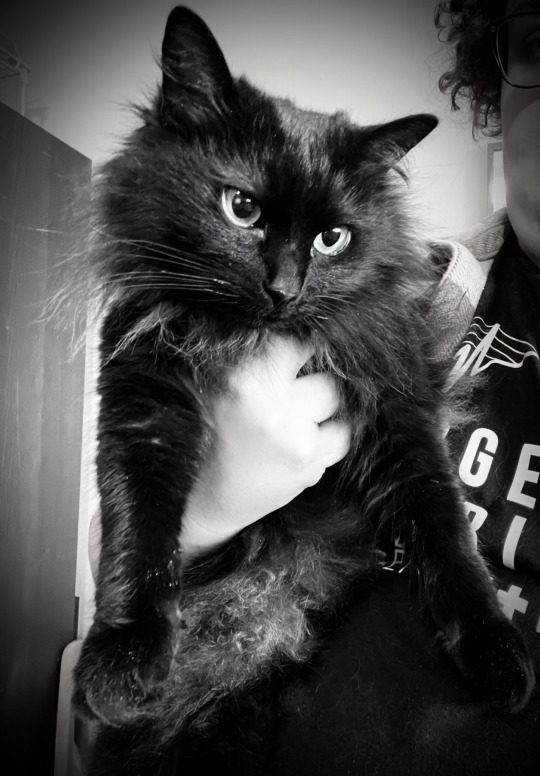
35 notes
·
View notes
Note
Do you have any unpopular and/or strong opinions about car care? Products people get or don’t when they should?
I’m in the freaking out about getting a cat soon stage lol
🩵💜🩵💜
hiiii<3 congratulations you have pressed my special interest button! I have extremely strong opinions on proper cat care from the perspective of a rescuer since every day I am faced with cleaning up the messes of people who do NOT take care of their cats properly. I am putting everything under the cut since this will include mentions of animal abuse/neglect etc. And also it’s going to be very long I fear.
First and foremost as I’m sure you will soon be able to tell animal welfare is something I am very very passionate about. Rescue work is my entire life. These are all things I have had to repeat over and over to people who just don’t care/don’t get it and so if some of it sounds aggressive that is NOT directed at you (Michal) 😭 I’m talking to the royal you here since this is advice for everybody.
the most important thing in the world is to make sure your cat is FIXED. if she is coming from a rescue she likely already is, but if shes not, make sure you have an appointment set up to get it + rabies and FVRCP vaccines done asap (I also recommend getting the feline leukemia vaccine, which is not usually done in house by rescues). I would even make the appointment now if you know when you are bringing her home. on top of preventing countless health issues down the road, it will also keep her from reproducing if she ever accidentally gets outside. not only is that awful for the mom cat but we already have enough homeless kittens out there tyvm. PS this is just as important for male cats.
speaking of which, do not let your pet cat free roam outside*. Ever. here is a handy article outlining just a few of the many many reason why it is a terrible and irresponsible thing to do. I dont care if you think you live in a low risk area, or if your cat seems to want to get outside, or if you've had outdoor cats before with no issue. I have had to scrape countless dead cats out of the roadway after being hit by cars because their owners let them outside. Rat poison (very commonly found around peoples houses and in trash cans), if ingested, will literally cause an animal to exsanguinate and die in agony. Other stray cats in the area could be carrying FIV/FeLV or worse. If any of your neighbors grow lilies and your cat brushes against one and licks the pollen from their fur, they will die. There’s just so many reasons to keep your cats indoors I could go on about this forever. if you absolutely must take your cat outside either leash train them (properly, dont just take them out on a leash for the first time and expect them to be okay with it) or get a kitty stroller. But there are PLENTY of ways to keep your cat enriched and entertained indoors. Cat trees, shelves, bird feeders outside, interactive toys, treat dispensers, just to name a few. Go on chewy.com and just browse. They have an excellent selection and great customer service. Another alternative is building a catio! Just make sure your cat receives regular flea/tick treatment year round.
avoid the hell out of those backpack carriers with the clear plastic windows. those are terrifying for cats to be in they feel completely exposed and the ventilation is shit. get a proper hard sided (plastic) carrier. I recommend one with two doors (one on the front and one on top, otherwise known as a top loading carrier). When you travel outside or in the car be sure to cover the carrier with a towel or blanket. This calms them down a lot. The reasons I recommend against soft/mesh carriers are: they are impossible to clean or sanitize if your cat has an accident (very common in the car) or contracts an infectious disease, they provide no protection in the event of being dropped or if you are in a car accident or if you run into a cat-aggressive dog in the vet waiting room, and especially anxious cats can and will fight their way out of them and having a terrified cat loose in your car on your way to the vet is extremely dangerous for both of you.
Expect your new cat to be scared and shy for a few days-to-weeks, minimum. This isn’t always the case, but it is more often than not. I have had so many cats returned for not being friendly enough right away because adopters were too impatient to wait. It takes cats time to decompress in a new environment. I recommend keeping your new cat in a separate room like a bathroom or small bedroom for the first few days so a) it is less overwhelming and b) once you allow them access to the rest of the house, that room will be their “safe space” to retreat to. Also normal when a cat has experienced an environmental shift are: mild vomiting and/or diarrhea (I recommend keeping the cat on whatever diet they have been fed previously and doing a slow transition to your food of choice, + add in probiotics. Proviable and Fortiflora are two brands I like, both available on chewy), hiding in one place for the first 24ish hours, and occasionally stress induced urinary issues such as UTIs. To best avoid the latter make sure their litter box is somewhere they can get to easily without encountering any human or animal traffic. But don’t put it next to their food/water obviously.
And speaking of food/water! Cats tend not to like their food to be right next to their water. I recommend placing the dishes a few feet away at least if not in separate areas of the room. Also, cats by nature do not drink enough water usually so some amount of wet food in their diet is pretty important, and water fountains/bubblers also help get them to drink more. Chronic dehydration can cause urinary issues and more. Dry food is better for their teeth but higher in carbs and a dry-only diet often leads to an overweight cat, and wet food can cause plaque buildup faster but has a much higher moisture content. A balance of both is ideal. Avoid raw diets as well as these food brands: Hartz**, kit & caboodle, meow mix, friskies.
If you keep houseplants, be very very careful. Cats are curious and love to chew on anything that smells like nature and will go out of their way to do so, but a LOT of common houseplants are toxic to cats (for example, every part of the Lily flower, if ingested and not treated immediately, will kill your cat within a day). The ASPCA has a database online to search for plants and see if they are toxic or not.
The rule of thumb with litter boxes is 1 per cat +1. So if you have one cat, you need a minimum of 2 litter boxes, preferably in separate rooms of the house. Corners and secluded areas with little foot traffic are ideal. Make sure the box is the length of your cat standing up + about 6 inches for ideal comfort. Avoid “lightweight” litter; it’s super dusty and very fine and can irritate both your lungs and your cat’s lungs.
Stay on top of your annual vet exams. Even if your cat seems perfectly healthy it’s better safe than sorry, and having a good rapport with your veterinarian makes it much easier to deal with them in the event of an emergency. And on that topic, make sure you know where your local ER vets are + their hours and phone numbers. Cats are tough and resilient but they are also fragile and stupid.
*obviously different rules may apply if your cat is feral or semi feral and cannot live happily indoors. It is not typically a good idea to try and force a feral/working cat to be strictly indoors before they’re ready. But a regular domestic pet cat does not ever “need” to be outside, nor is it cruel to keep them in. This doesn’t always stop them from being interested though, so be careful around doors until you know how your cat will behave around them.
**while the other brands are just low in nutrients, high in filler byproducts, and just overall not super healthy, Hartz brand products (especially their flea and tick medication and shampoos) have been known to straight up kill peoples pets. Like, a LOT. I have seen this happen countless times. Everyone I know who’s ever used a Hartz product has a horror story about it. Do not ask me how they’re still in fucking business.
Honestly that’s all I can think of off the top of my head but I’m sure I’m forgetting some stuff. If you have any specific questions you can hit me up, I don’t mind! Part of my job as a rescuer is educating the public so this is information I am very happy to share. Congrats on your new kitty and good luck!!!!
#catposting#I know some people are gonna disagree with some of this and I honestly don’t care#you cannot even imagine the things I have seen as a rescuer and so many of those horrors could have been prevented by people following#this advice#so yes feel free to send follow up questions or whatever but I’m not going to debate any of this with anyone#asks#office hours
17 notes
·
View notes
Text
the worst vaccine related story I got from working in vet med was from a family who took in some kittens who were later diagnosed with, iirc, panleukopenia. the kittens got sick and were euthanized, but they also had an established adult cat that hadn't had an FVRCP vaccine in 5 or so years. that cat got sick as well and also had to be euthanized. I truly cannot imagine how devastating that was for that family and it makes me so deeply sad for them every time I remember it.
7 notes
·
View notes
Text
Max was not chipped and the vet estimated he's a year and a half old. He got the FVRCP rabies and feline leukemia vaccines and he had worms so he was dewormed
9 notes
·
View notes
Text
"Neuter Your Ex" – because some exes shouldn't pass on their genes! 🔪💔
For a $40 donation, claim your revenge and support our TNR (Trap Neuter Return) program Ouija’s Wishes by naming a feral cat. Let's ensure the only legacy they leave is a spayed or neutered cat! 🐾😼
To participate fill out this form:
https://forms.gle/FfByDHHRVTCpZJPM6
Cash App: https://cash.app/$FARSohio
Venmo: https://venmo.com/u/FurAngelsRescueShelter
(3914 ending number)
If you donate via Facebook take a screenshot of your donation and send it to us! We cannot see what everyone donates individually
Each feral cat will be fixed, ear-tipped, rabies vaccine, and an FVRCP vaccine!
TNR (Trap-Neuter-Release) is a very important program which helps to lower the population of stray and feral cats in our community. Your generosity ensures a feral cat’s well-being and a chance for a brighter future.
Every contribution counts! 🐾💜 #Ouijaswishes #trapneuterreturn #DonateForACause
This is strictly for fun, so nothing derogatory will be posted.
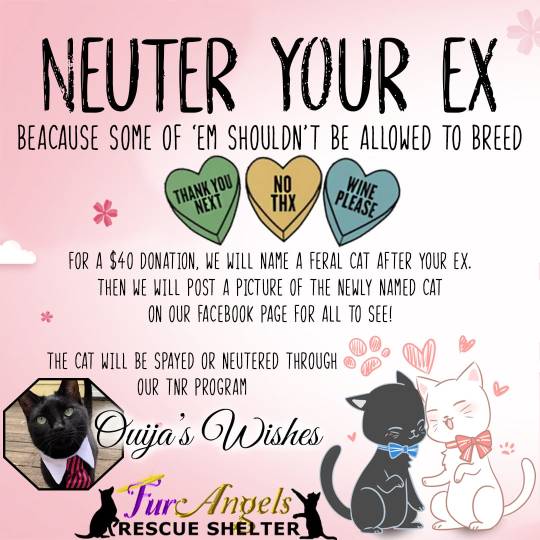
#fur angels rescue shelter#toledo#toledo ohio#adopt#cats#valentines day#spay and neuter#Neuter your ex#ex relationship#Ouijas wishes#donate#save a life#Trap neiter return#Tnr#pets#cute#ohio#fars#adoptdontshop#warrior cats
3 notes
·
View notes
Text
"CLOWDER" for 30% off "Cat Lovers" section!
Hi! We are certified Crazy Cat People™️ and we need help. A week ago in the snow, while trying to trap a different cat we saw lurking around outside, this guy showed up on our porch drinking water left outside, pitiful and upset.

This is now the 4th cat that has showed up on our back deck (and let us catch them!) in a little over a year. The first was a feral and needed hip surgery, 2nd was starving and had tapeworms like this guy, 3rd was a young lad who was also very skinny and grew quickly after we brought him in. All those cats, plus the 2 others we rescued/were given to us from what seemed like a hoarding situation, needed every single one of their shots, FIV/FeLV/heartworm testing, microchipping, and to be sterilized on our dime. And of course…our one pre-existing cat from before we moved here is very elderly and chronically ill.
When we pulled him in, we gave him praziquantel for the worms, a capstar for his fleas, and he's had 2 baths (both from him peeing himself from fear...poor guy). Thankfully, this guy also had very generous benefactors who paid for his testing! He is negative for FIV/FeLV, no longer has any intestinal parasites, doesn't have ear mites, urinalysis didn't seem concerning nor did CBC, he's got his rabies shot and first FVRCP, and he's feeling better enough to spend all his time screaming at the small window in his little room now. His neuter is scheduled for Feb 12th and prepaid, and after that he will be rehomed.
I'm disabled and my shop is my only job. My partner is currently out of work because he gets chronic migraines and has chronic back pain and they refused to schedule him manageable shifts so that his migraines would be triggered less often.
Rescues are all full; anyone involved in rescue small and large scale within the past few years knows the homeless animal population worldwide skyrocketed in 2020-21 because of the plague and how people reacted to it, and it was already horrible.
With 6 other cats, cats who permanently call our home their own, we are super, super financially overwhelmed. I'm trying to afford a Popur litter box before my own hip surgery in early March of this year to help alleviate some of the physical burden.
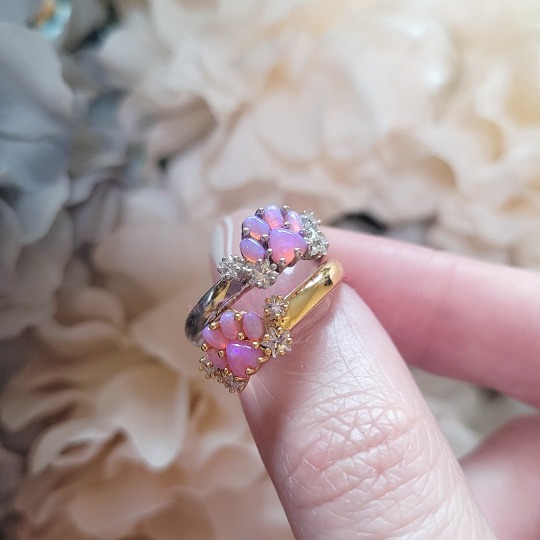
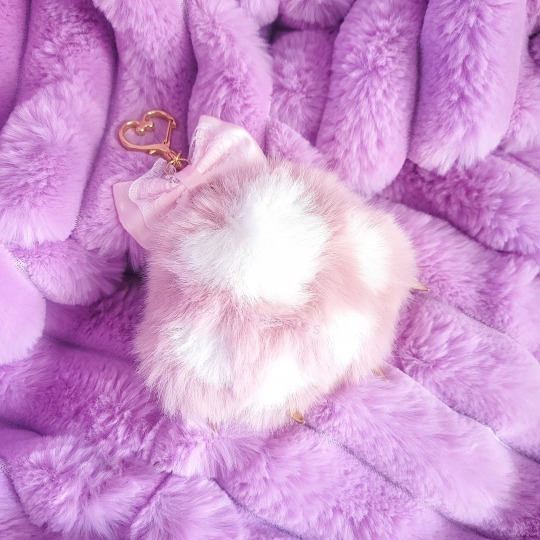
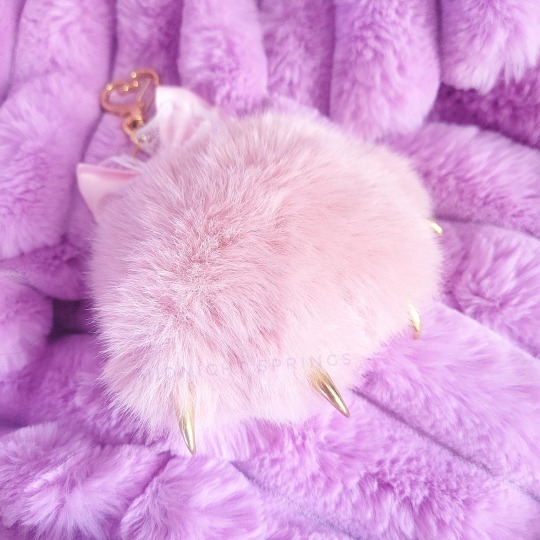

Please consider sharing the word about the cat-themed designs in my shop! If you want to help the cats directly, there is also this Amazon wishlist. Thank you so much for reading!
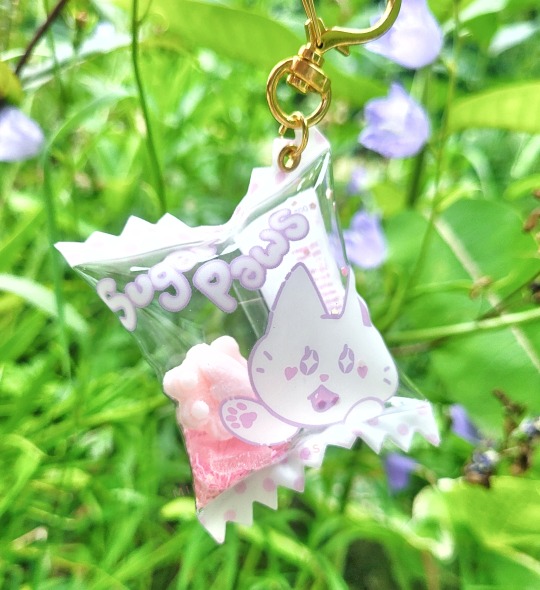


#fairykei#jfashion#cat lady#crazy cat lady#cats of tumblr#animal rescue#cat rescue#pets#cute jewelry#original art
2 notes
·
View notes
Text

In Baltimore City, MD: (3) Fluffy and irresistible 4-week-old kittens are seeking rescue placement - BARCS, Baltimore MD
- Rescue Needed -
Huluween 1-3- 4 weeks, all males
The fluffy, perfect, and adorable 'Huluween' kittens were brought to the shelter by a Good Samaritan after being found in someone's rear yard. They're a little bit nervous, understandably, but are easily handled and downright irresistible.
Upon examination, our vets noted that the Huluween kittens appear overall healthy at this time. They were given dewormer and flea preventative, as well as their first FVRCP vaccines. Full medical summaries can be provided upon request.
The Huluween kittens are available immediately for rescue pick-up.
Please let us know if your organization can help!
Thank you,
The BARCS Rescue Team
Baltimore Animal Rescue & Care Shelter (BARCS)
New Address! 2490 Giles Rd, Baltimore, MD 21225
[email protected]| (410) 396-4695
Rescue pick-up hours:
Monday-Friday: 10:30 a.m.-6:30 p.m.
Saturday and Sunday: 8:30 a.m.-4:30 p.m
Adoption hours:
Monday-Friday: 2 p.m.-6 p.m.
Saturday and Sunday: 11 a.m.-4 p.m.
Baltimore Animal Rescue and Care Shelter, Inc. (BARCS) | 2490 Giles Rd, Baltimore, MD 21225
3 notes
·
View notes
Text





Absolute fucking unit of a British shorthair. Again I'm not an expert in the standard but he appears to be absolutely perfect. Just stunning. I bent two needles giving him an fvrcp booster because his shoulder muscles are so thick and dense.
206 notes
·
View notes
Text
Essential Guide: 7 Must-Know Facts About the Fvrcp Vaccine for Cats and Its Importance
Learn everything about the fvrcp vaccine for cats, its importance, symptoms, treatment options, and preventative measures to keep your feline friend healthy. The fvrcp vaccine for cats is a vital tool for keeping our feline friends safe and healthy. It protects them from serious diseases like feline panleukopenia, feline calicivirus, and feline rhinotracheitis. These illnesses can cause severe…
0 notes
Text
Maine Coon kittens health records
Maine Coon Kittens Health Records – What You Need to Know for a Healthy Start
When you bring a Maine Coon kitten into your home, one of the most important considerations is ensuring that the kitten is healthy and well taken care of from the start. A Maine Coon kitten’s health records play a crucial role in tracking their medical history and providing vital information for their ongoing care. Whether you are adopting or buying from a breeder, understanding the significance of these health records ensures that your kitten has a healthy, happy life.

Why Are Health Records Important?
Health records for Maine Coon kittens provide a detailed history of the cat’s medical care, vaccinations, deworming treatments, and any other medical interventions. These records are essential for keeping track of the kitten’s progress as they grow and helping to prevent any future health issues.
The importance of having proper health records extends beyond just immediate care. When you bring your kitten to a vet for checkups or vaccinations, the vet can refer to the health records to determine what has already been done and what needs to be continued or updated. If you ever need to board your Maine Coon or take them to another vet, these records will also be useful for ensuring consistency in their care.
What Should Be Included in Maine Coon Kittens’ Health Records?
When you receive your Maine Coon kitten’s health records, you should expect them to include the following details:
Vaccinations: The record should clearly outline all vaccinations the kitten has received, including core vaccines like rabies, feline distemper (FVRCP), and feline leukemia (FeLV). Most breeders will have started these vaccinations by the time the kitten is ready for adoption, but it’s important to continue their vaccination schedule once the kitten is in your care.
Deworming Treatments: Kittens are often treated for internal parasites, such as roundworms and hookworms, before they are sold or adopted. The health record should document any deworming treatments and the dates when they were administered.
Spaying/Neutering Status: Many breeders or shelters spay or neuter Maine Coon kittens before they are adopted, but if not, the record should indicate when the kitten is due for this important procedure. Spaying and neutering help prevent health problems and behavioral issues down the line.
Microchipping: If the kitten has been microchipped, the health records should include the microchip number and registration details. Microchipping is an essential step in ensuring your kitten can be easily identified if lost.
Genetic Testing: Maine Coons are prone to certain genetic conditions, including hypertrophic cardiomyopathy (HCM), a heart disease that affects the breed. Some breeders may test their breeding cats for genetic diseases and include this information in the kitten’s health records. While not all breeders conduct this testing, it is a good sign when they do, as it helps ensure that the kitten is less likely to inherit serious health conditions.
Veterinary Visits: The records should also note any visits to the vet, including routine health exams or any specific treatments for illnesses or injuries. This information will be helpful for your vet in maintaining consistent care.
How to Maintain Health Records
Once you bring your Maine Coon kitten home, it’s essential to keep their health records organized and up to date. Consider keeping a file with their vaccination history, vet visits, and any treatments received. When visiting a new vet, share these records to ensure that your kitten receives the most accurate and tailored care.
The Role of Your Vet in Your Kitten’s Health
Once you adopt or purchase a Maine Coon kitten, you should schedule a visit with a veterinarian to establish a routine care plan. The vet will typically conduct a thorough examination and may suggest additional vaccinations or treatments. Regular checkups will help monitor the kitten's health as they grow and develop into adulthood.
Conclusion
The health records of your Maine Coon kitten are vital for tracking their well-being, ensuring they receive proper care, and preventing potential health issues. Whether you adopt from a breeder or a rescue, make sure you obtain a complete set of health records and keep them updated throughout the kitten’s life. Regular vet visits, proper vaccinations, and attention to any breed-specific conditions will help your Maine Coon live a long, happy, and healthy life with your family.
0 notes